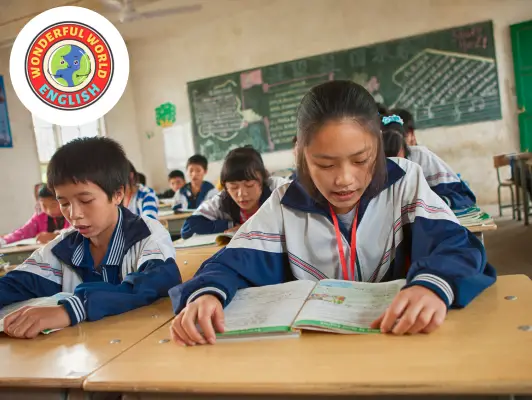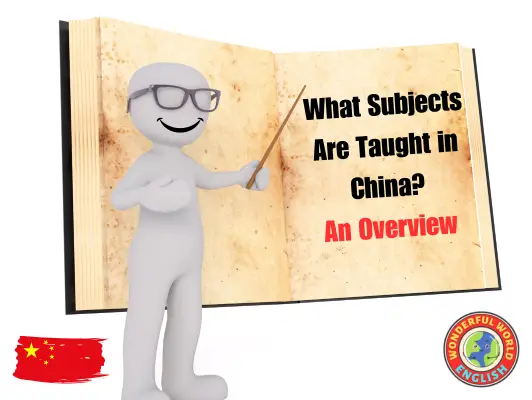Contents
Toggle
Meet David De’ Ath, founder, editor, and writer at Wonderful World English. With his extensive background as an English teacher, David provides valuable insights and practical tips on ESL for students and teachers alike.
Education in China encompasses a broad array of subjects, reflecting a curriculum designed to equip students with a well-rounded knowledge base.
The compulsory education system in China lasts for nine years, including six years of primary education and three years of junior high school.
Subjects taught during primary school often include integrated courses like Morality and Society as well as discrete subjects such as Chinese, Mathematics, and English.
At this level, the emphasis is on building a solid foundation in key academic areas.
As students progress to secondary education, the curriculum becomes more diversified and specialized.
In junior high school, students encounter an expanded range of subjects, such as Chemistry, Physics, Biology, and Political Education.
This introduces them to more complex concepts and prepares them for the academic challenges of senior high school.
The Ministry of Education oversees the curriculum across these stages, continually adapting it to meet the needs of the country’s educational objectives and the development of its students.
Key Takeaways
- China’s curriculum includes a wide range of subjects designed to provide a comprehensive education.
- Compulsory education in China spans nine years and introduces progressively complex subjects.
- The education system in China evolves to meet nationwide educational goals and development.
Educational Structure and Stages
In China, the educational journey is meticulously structured, taking students from early childhood through various stages, culminating in higher education.
Each phase is carefully designed, integrating compulsory and post-compulsory education, aimed at fostering academic and vocational excellence.
Pre-School and Primary Education
Pre-School: Education in China begins with preschool, which, although not compulsory, is attended by a large number of children. This stage caters to children aged 3 to 6 and focuses on early childhood development.
Primary Education: The journey continues with primary school, providing six years of compulsory education.
Subjects like Chinese, mathematics, and English form the core curriculum.
The emphasis is on laying a strong foundation of basic knowledge and skills.
Secondary Education and National Exams
Following primary education, students enter secondary education, which includes junior secondary education (often referred to as middle school) and senior secondary education (high school).
During these years, students typically undergo nine years of compulsory education, known as nine-year compulsory education, ending with the completion of junior secondary education.
Junior Secondary Education: Ending with an important milestone, the Zhongkao, students are tested on a wide range of subjects, including but not limited to Chinese, mathematics, English, and science.
Senior Secondary Education: Upon passing the Zhongkao, students may choose between a traditional high school or vocational school.
For those pursuing an academic track, the highly competitive Gaokao, or National College Entrance Examination, signifies the culmination of senior secondary education and determines entry into higher education institutions.
Higher Education and Postgraduate Opportunities
Higher Education: A multitude of universities and colleges across the country offer a diverse range of undergraduate programs.
The institutions cater not only to national students but also to an increasing number of international students who opt to study in China.
Postgraduate Education: Following undergraduate studies, ambitious students may engage in postgraduate programs leading to master’s or doctoral degrees.
The growing number of graduates reflects the expanding opportunities and resources available in China’s higher education system.
Teaching in China can be an incredibly wholesome and rewarding experience.
For more insights into why this can be an awesome career move, check out the guide below!
Related: Why Teach in China: Uncovering the Benefits

Curriculum and Core Subjects
The educational landscape in China is structured to provide a comprehensive and standardized set of core subjects throughout the stages of compulsory education, with additional specialized and elective courses offered.
Compulsory Core Subjects
In China, the compulsory part of education consists of subjects that students are mandated to study.
These subjects form the backbone of the educational curriculum and are aimed at delivering well-rounded foundational knowledge. The core subjects typically include:
- Chinese Language: A focus on literacy, language structure, and comprehension.
- Mathematics: Covering arithmetic, algebra, geometry, and statistical concepts.
- English Language: Basic to advanced English language learning, emphasizing reading, writing, speaking, and listening skills.
- Science: A general science curriculum that later branches into specific subjects like Biology, Chemistry, and Physics.
- Social Sciences: Encompassing History, Geography, Philosophy, and studies of social structures.
- Fine Arts: Education in visual and performing arts to foster creativity.
- Physical Education: Encouraging physical development, including sports and exercise.
- Information Technology/Computer Science: Basic computer skills progressing to more complex IT concepts.
These compulsory subjects are laid out within China’s national curriculum, and ensure that every student receives a uniform standard of education in their formative years.
Specialized and Elective Courses
As students progress in their education, specialized and elective courses become available. These courses allow students to pursue areas of personal interest or talent, complementing the compulsory curriculum.
Notable specialized and elective courses include:
- Advanced Mathematics: For those with a keen interest or aptitude in math.
- Advanced Sciences: More in-depth studies in biology, chemistry, or physics.
- Foreign Languages: Options to study languages other than English.
- Technology-Based Subjects: Covering advanced computer science, programming, and robotics.
- Arts Electives: Including music, theatre, and advanced visual arts.
The curricula for these courses are typically guided by the Curriculum Standards 2022, which emphasizes relevancy and competencies crucial for students’ development.
Teaching in China can be a valuable professional experience rich with cultural immersion while offering the chance to significantly impact students’ English language skills.
For more insights into TEFL certificates and how you can get your hands on one, check out the guide below!
Related: TEFL Certificates: Your Guide to Teaching English Abroad

Conclusion
In conclusion, China’s education system offers a comprehensive and multifaceted curriculum designed to provide students with a broad and balanced education.
From the foundational years in primary education through the more specialized and challenging phases of secondary education, students in China are exposed to a wide range of subjects that cater to various interests and academic needs.
The system’s structured approach, underpinned by the Ministry of Education’s oversight, ensures that all students receive a consistent and high-quality education, preparing them for success in higher education and beyond.
As China continues to evolve its educational offerings, it remains a dynamic landscape for learning, reflecting the country’s commitment to cultivating well-rounded, knowledgeable, and capable individuals ready to contribute to an increasingly globalized world.
We hope you find value in this information; you can contact us if you require any support.
Have a wonderful day!
Image Attribution: All images licensed via canva.com





